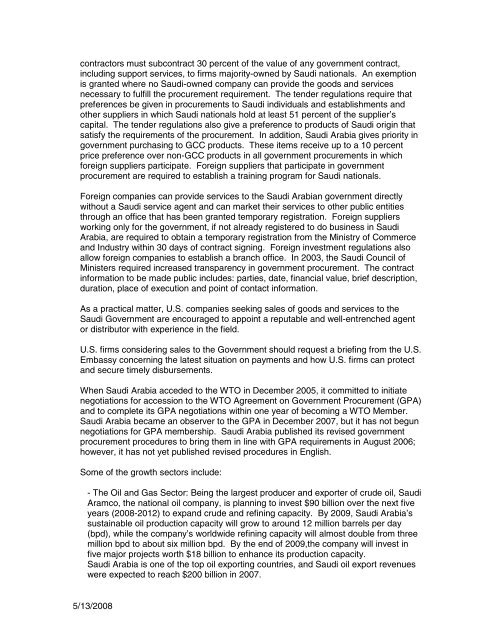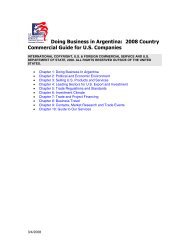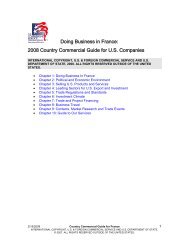Doing Business In Saudi Arabia - Bna
Doing Business In Saudi Arabia - Bna
Doing Business In Saudi Arabia - Bna
Create successful ePaper yourself
Turn your PDF publications into a flip-book with our unique Google optimized e-Paper software.
contractors must subcontract 30 percent of the value of any government contract,<br />
including support services, to firms majority-owned by <strong>Saudi</strong> nationals. An exemption<br />
is granted where no <strong>Saudi</strong>-owned company can provide the goods and services<br />
necessary to fulfill the procurement requirement. The tender regulations require that<br />
preferences be given in procurements to <strong>Saudi</strong> individuals and establishments and<br />
other suppliers in which <strong>Saudi</strong> nationals hold at least 51 percent of the supplier’s<br />
capital. The tender regulations also give a preference to products of <strong>Saudi</strong> origin that<br />
satisfy the requirements of the procurement. <strong>In</strong> addition, <strong>Saudi</strong> <strong>Arabia</strong> gives priority in<br />
government purchasing to GCC products. These items receive up to a 10 percent<br />
price preference over non-GCC products in all government procurements in which<br />
foreign suppliers participate. Foreign suppliers that participate in government<br />
procurement are required to establish a training program for <strong>Saudi</strong> nationals.<br />
Foreign companies can provide services to the <strong>Saudi</strong> <strong>Arabia</strong>n government directly<br />
without a <strong>Saudi</strong> service agent and can market their services to other public entities<br />
through an office that has been granted temporary registration. Foreign suppliers<br />
working only for the government, if not already registered to do business in <strong>Saudi</strong><br />
<strong>Arabia</strong>, are required to obtain a temporary registration from the Ministry of Commerce<br />
and <strong>In</strong>dustry within 30 days of contract signing. Foreign investment regulations also<br />
allow foreign companies to establish a branch office. <strong>In</strong> 2003, the <strong>Saudi</strong> Council of<br />
Ministers required increased transparency in government procurement. The contract<br />
information to be made public includes: parties, date, financial value, brief description,<br />
duration, place of execution and point of contact information.<br />
As a practical matter, U.S. companies seeking sales of goods and services to the<br />
<strong>Saudi</strong> Government are encouraged to appoint a reputable and well-entrenched agent<br />
or distributor with experience in the field.<br />
U.S. firms considering sales to the Government should request a briefing from the U.S.<br />
Embassy concerning the latest situation on payments and how U.S. firms can protect<br />
and secure timely disbursements.<br />
When <strong>Saudi</strong> <strong>Arabia</strong> acceded to the WTO in December 2005, it committed to initiate<br />
negotiations for accession to the WTO Agreement on Government Procurement (GPA)<br />
and to complete its GPA negotiations within one year of becoming a WTO Member.<br />
<strong>Saudi</strong> <strong>Arabia</strong> became an observer to the GPA in December 2007, but it has not begun<br />
negotiations for GPA membership. <strong>Saudi</strong> <strong>Arabia</strong> published its revised government<br />
procurement procedures to bring them in line with GPA requirements in August 2006;<br />
however, it has not yet published revised procedures in English.<br />
Some of the growth sectors include:<br />
- The Oil and Gas Sector: Being the largest producer and exporter of crude oil, <strong>Saudi</strong><br />
Aramco, the national oil company, is planning to invest $90 billion over the next five<br />
years (2008-2012) to expand crude and refining capacity. By 2009, <strong>Saudi</strong> <strong>Arabia</strong>’s<br />
sustainable oil production capacity will grow to around 12 million barrels per day<br />
(bpd), while the company’s worldwide refining capacity will almost double from three<br />
million bpd to about six million bpd. By the end of 2009,the company will invest in<br />
five major projects worth $18 billion to enhance its production capacity.<br />
<strong>Saudi</strong> <strong>Arabia</strong> is one of the top oil exporting countries, and <strong>Saudi</strong> oil export revenues<br />
were expected to reach $200 billion in 2007.<br />
5/13/2008












